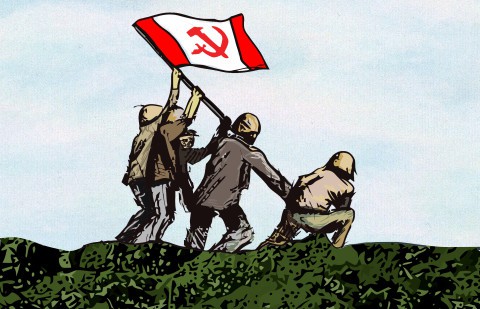GRAEME MARK
While low voter turnout is regarded as a perennial issue in Canada — especially among young people — there are those on the University of Saskatchewan campus who believe that not voting is a worthwhile option in the upcoming federal election.
So far, there has been a huge effort to get people out to vote in this election. On campus, the U of S Students’ Union has been actively encouraging students to participate in the electoral process, hosting debates, organizing a trivia night and facilitating voter registration.
But maybe voting isn’t the best choice for you. A poll conducted in September 2015 by Global News found that 40 per cent of Canadian voters think that the Liberals, NDP and Conservatives “are basically the same.” Is voting just a false sense of democracy if your three major options are indistinguishable from each other?
Nick Marlatte, a political studies graduate student at the U of S who identifies as a communist and anti-capitalist, is tackling this issue by participating in a boycott of the election called for by the Revolutionary Communist Party of Canada — a party which Marlatte supports but is not a member of.
Marlatte does not believe meaningful change can come about through the democracy we currently have in Canada. As such, he views the boycott as a means to organize with fellow non-voters in an effort to end capitalism and austerity and replace it with a more equal economy.
to end capitalism and austerity and replace it with a more equal economy.
Marlatte clarifies that the purpose of the boycott means more than just not voting.
“[It] is not to encourage voters not to vote, but rather to reach out to and organize the 40 per cent of Canadians who are eligible to vote but choose not to, or even those that are already highly suspicious of the value of their vote,” Marlatte said.
For Marlatte, the premise that voting is not a viable means for change is rooted in the belief that “political parties are beholden to the money that funds them, not voters.”
The boycott is trying to organize non-voters who don’t have the financial means to influence a party or who are predominantly less enfranchised by the system.
Concerning how our current electoral system functions, Marlatte thinks the Liberal, Conservative and NDP political representatives do not accurately reflect their electorate.
They are “well educated white males that come from a relatively well-off background,” Marlatte said.
Then there’s the issue of capitalism. In a bygone era, there was a global debate over whether capitalism was the best economic system, but since the end of the Cold War, this debate has all but been silenced.
If capitalism seemingly came out on top, then what’s Marlatte’s beef with it?
“Capitalism is prone to crises like the Great Depression, the labour crisis of the 1970s and the 2008 financial crisis. These crises result in lack of confidence in the market, profits fall and job growth stagnates,” Marlatte said.
The ability of the ruling class to cut workers’ wages to increase profitability highlights Marlatte’s main criticism of capitalism, since the interests of the ruling class and the working class are at odds, resulting in a predatory economy that allows the former to exploit the latter.
“The ultimate issue is that the change that we need to see is not ever going to come from the ballot box,” Marlatte said. “Winning parties have to support the capitalist class, or else they will not be viably funded. Similarly, they need to function within capitalism, and this means responding to the needs of its structure. The game is rigged, and all we can do is organize to create an alternative.”
You may not agree with everything Marlatte has to say, but aren’t elections supposed to be a forum for national debate? We’ve been led to believe that our political parties are more different than they are similar, and we are left arguing about the small differences between them.
If none of the parties’ messages are resonating with your beliefs, perhaps not voting, spoiling your ballot or organizing to demand better representation is your best option.
Leave a Reply